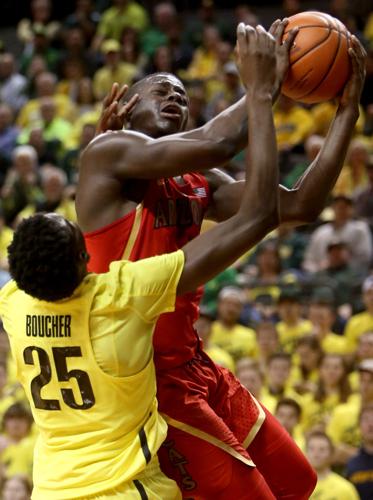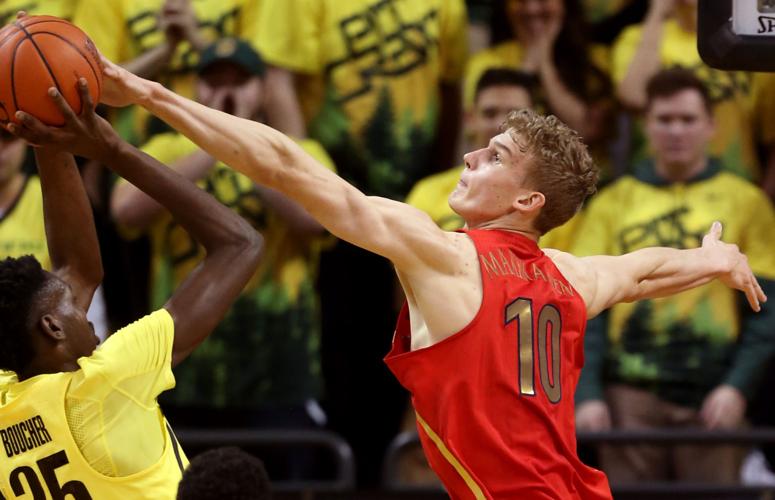EUGENE, Ore. — Because he was one of the few Arizona Wildcats showing life late in a long-dead game Saturday, freshman forward Rawle Alkins is believable when he says he hopes to face Oregon again.
But recent history suggests the Wildcats really don’t want to see the Ducks anytime soon.
In fact, the Pac-12’s unbalanced schedule has been the Wildcats’ friend the past two seasons: It allowed only one regular-season matchup between the Wildcats and Ducks, and the series has still been costly for Arizona.
First, there was the Ducks’ 83-75 smashing of Arizona’s 49-game homecourt winning streak last season at McKale Center. Next, there was Oregon’s overtime defeat of UA in the Pac-12 Tournament last season, likely sealing Arizona’s undesirable NCAA Tournament placement in Rhode Island.
Then Saturday happened, an 85-58 destruction that was the worst ever suffered by a ranked UA team under coach Sean Miller.
The Wildcats still left Eugene tied for first place with the Ducks at 10-1, and UCLA’s road destruction of the Washington schools suggests Arizona might even get sole possession of first place by Thursday night, when Oregon has to face the Bruins in Pauley Pavilion.
But whether the UA winds up with the No. 1 Pac-12 Tournament seed or the No. 2 seed they are currently in line for, the Wildcats probably want to steer clear of the Ducks in either the tournament semifinals or finals.
Here are three reasons why, and what UA can do about it if it happens anyway.
1. Markkanen can be marginalized
Finnish freshman forward Lauri Markkanen was already coming off an uncharacteristically tough game at Oregon State when the Ducks made his life rougher on both ends of the court Saturday.
When Markkanen plays power forward, that means he’s often in the undesirable position of having to guard Oregon matchup nightmare and foul magnet Dillon Brooks.
Markkanen picked up one foul just 62 seconds into the game, and two within the first 3:08 of the second half, when the UA had him at power forward.
Meanwhile, on offense, the Ducks’ aggressive matchup zone defense — full of long, athletic wings — helped quiet Markkanen’s face-up game. He took just five shots on Saturday and made only one of them, making him 2 for 11 for the weekend.
While Markkanen still towered over anyone who defended him, Miller said he still couldn’t easily post guys up because there was always a shot-blocker —Chris Boucher or Jordan Bell — in the way.
“Every team that plays him is aware of how great a shooter he is,” Miller said. “I think part of what we have to continue to develop is allowing him to use his size.
“Not just on offensive rebounds or shooting it over somebody, but giving him the ball and allowing him to get fouled or score and use his size to his advantage.”
2. Some Ducks might carry a grudge
A week after Miller offered a scholarship to Allonzo Trier in June 2014, a similarly skilled Los Angeles wing named Tyler Dorsey decided to decommit from the Wildcats.
Instead, Dorsey signed on at Oregon, where he was shooting 36.2 percent from 3-point range entering Saturday’s game including just 15 for 48 (31.3 percent) in Pac-12 games.
Dorsey hit all six bombs he took on Saturday.
And, in what also may be worth noting, a Phoenix-area guard that UA never recruited, Casey Benson, went 3 for 5 from long range off the bench.
“Tyler Dorsey, he was incredible,” Miller said. “Especially coming into the game he wasn’t shooting the ball maybe as well as he was capable. Him and Benson really, really hurt us. Those guys deserve a lot of credit.”
3. Oregon has set the pace and tone
Oregon had eight steals and seven blocked shots Saturday, firing up the path to 14 fast-break points.
Many of the Ducks’ 16 3-pointers came off that break, destabilizing an Arizona defense that had held previous Pac-12 opponents to just 28.1 percent 3-point shooting while running the conference’s third-slowest tempo in league games.
That Oregon offensive success, in turn, appeared to have further demoralized Arizona’s own offense on the other end.
“No question,” Miller said. “It starts to affect your offense. It starts to affect everything. Sometimes you can almost can’t run as fast as you normally do, because it’s a feeling like we usually don’t have — nothing is going right.
“But I know effort wasn’t the problem. Certainly execution (was), and at times when we had good execution, we missed a couple of shots.
“We need to play great. And in my opinion if we played great, it still wouldn’t have been enough because of how they played.”
In the Pac-12 Tournament, Arizona may get another chance at the Ducks.
Whether or not that makes a difference is unknown.
But Alkins would like to try.
“No one’s happy in the locker room,” he said. “Oregon played great and hopefully we see them again.”





